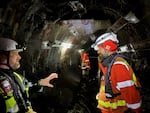
Inspectors recently checked the integrity of a tunnel that drains water out of Spirit Lake near Mount St. Helens.
Courtesy of US Forest Service
In the early evenings, a thick mist often forms on Spirit Lake, wrapping around the trees and snaking down nearby valleys. It’s easy to see how a tired hiker might conjure shapes in the haze, which is why it’s called Spirit Lake.
Roy Ford, an 82-year-old carpenter from Kelso, used to own a cabin by the lake in Skamania County and has never seen anything unusual. Instead, what he remembers is the sense of community around the lake before Mount St. Helens erupted in 1980.
“The people that knew each other then, our grandkids are intermarried and are friends,” he said.
Ford’s cabin was one of about 50 buried by the eruption on May 18 along with scout camps and a YMCA cottage. 57 people lost their lives.
Spirit Lake also changed forever.
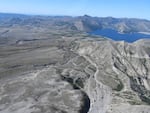
An aerial view of Spirit Lake and the pumice plain that holds it in.
Courtesy of US Forest Service
First, an avalanche of debris shoved the lake sideways, creating a massive wave. Then the returning water sloshed thousands of trees and ash back into the lake, forcing the water level up 200 feet. At the same time, a pyroclastic flow blocked the lake’s outlet to the Toutle River, meaning the water had nowhere to go.
Over the years, the water pressure began to grow behind that natural dam. So, in 1985, the US Army Corps of Engineers built a tunnel one-and-a-half miles long to allow the water to drain into the Toutle River. But there was a problem.
“They were kind of band-aid repairs,” said Ryan Cole, who manages Spirit Lake for the Gifford Pinchot National Forest.
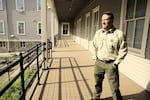
Ryan Cole manages Spirit Lake for the Gifford Pinchot National Forest. The U.S. Forest Service is working to find a longer-term solution for the lake.
Kristian Foden-Vencil / OPB
The tunnel was built through a vertical rock seam where two types of rock slide against each other. Where the tunnel travels through that particular spot, it buckles.
“And because they built it under emergency conditions, they didn’t reinforce it probably as much as they should have at the time,” said Cole.
The tunnel has been fixed several times over the years. But the rock seam will continue to move, and the tunnel will continue to buckle.
That’s a thought that keeps Larry Hembree, the director of Cowlitz County Emergency Management, awake at night.
He remembers the Cowlitz River just after the eruption: “It was very thick mud with lots of trees in it. There were pieces of housings or buildings in it.”
Standing next to the river in downtown Kelso recently, he said he worries that if the Spirit Lake tunnel fails catastrophically, the same thing could happen again.
“The consequences of that damn failure would be a 40-foot wall of water right where we’re standing,” he said.
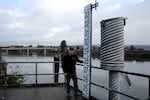
Larry Hembree is the director of Cowlitz County Department of Emergency Management. He's worried about what happens if the tunnel that drains water out of Spirit Lake fails.
Kristian Foden-Vencil / OPB
That wall could crash through other towns along the Cowlitz and Toutle Rivers, like Longview, Castle Rock and Toledo.
Understandably, people want a permanent fix for the Spirit Lake tunnel, and the U.S. Forest Service has some ideas. They could build a new, stronger tunnel. They could dig out a new channel above ground so the lake could more naturally flow into the Toutle River. They could also just keep the old tunnel and reinforce it when necessary.
Perhaps the most original idea is to install a long pipe just underground along the surface, then gradually shorten it so the water spurting out the end washes away the soil, creating a new outlet.
“Rather than cutting a giant open channel all at once and taking all of that fill material somewhere, we can allow nature … to slowly start cutting its way back,” Cole said.
The cost of each idea is unclear, as is the effect escaping silt would have on the river system. So, the Forest Service is asking for public comment.
Retired carpenter Roy Ford lives right next to the river in Kelso. But at his age, he’s not bothered by how the government fixes it. “I really don’t give a rip as long as it’s taken care of,” he said.
The preferred fix for Spirit Lake should be chosen by the end of 2025.
Congress has yet to appropriate money for the project so it will be years before any major work starts. Authorities say the tunnel will continue to get fixed every time it buckles.
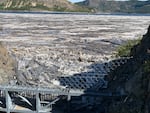
Thousands of logs were washed into Spirit Lake after the eruption of Mount St. Helens and have stayed there for 44 years.
Courtesy of US Forest Service
Meanwhile, Spirit Lake continues to settle into a natural balance. Thousands of logs still blow around its surface and will continue to do so for decades to come. And while the water was toxic with volcanic gasses after the eruption, it is now crystal clear and home to frogs, salamanders and lots of other wildlife.
